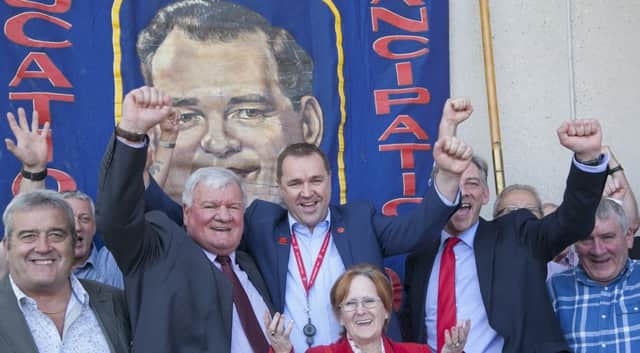Campaigners win review of policing during the miners' strike


Campaigners have welcomed the announcement of an independent review into the impact of policing during the 1984-5 miners’ strike.
Justice Secretary Michael Matheson said the dispute had left a shadow over some areas of the country which, more than 30 years on, continue to suffer from a “corrosive and alienating” sense of having being hurt and wronged.
Advertisement
Hide AdAdvertisement
Hide AdThose involved in the strike have long believed the police were used for political ends by Margaret Thatcher’s government, with picketers arrested on trumped-up charges and many blacklisted for years afterwards.
Announcing the review at Holyrood yesterday, Mr Matheson said he hoped it would bring “closure” for those involved.
But campaigners said they would continue to fight for a full public inquiry, something which has been repeatedly ruled out by successive Westminster governments.
Mr Matheson said: “It is generally understood that the 1980s represented an extremely difficult time for many communities throughout Scotland, mining communities in particular.
“I know from the conversations I have had that, although more than three decades have passed since the main miners’ dispute, the scars from the experience still run deep.
“In some areas of the country most heavily impacted the sense of having been hurt and wronged remains corrosive and alienating. That is true of many who were caught up in the dispute and aftermath. Those who were employed in the mining industry at the time, of course, but also wider families and communities.”
The Justice Secretary said he was determined not to let “sleeping dogs lie,” an approach he said had been adopted by governments in the past.
The miners’ strike, which lasted from 1984 to 1985, took place after Mrs Thatcher announced plans to close a number of pits which were deemed “inefficient”.
Advertisement
Hide AdAdvertisement
Hide AdDeclassified documents released last year showed the Thatcher government believed an inquiry into the policing of the strike would become a “witch hunt”.
According to the minutes of a 1985 meeting, then Home Secretary Leon Brittan wanted to avoid “any form of inquiry”.
In 2016, Amber Rudd ruled out holding an inquiry into the so-called Battle of Orgreave, when thousands of miners and police were involved in violent clashes at a coking plant in South Yorkshire.
It followed claims of an alleged cover-up after it emerged senior officers involved in the Hillsborough disaster five years later were also involved in the aftermath of Orgreave.
Addressing MSPs at Holyrood, Mr Matheson said: “I understand the great disappointment that arose, in October 2016, when the then home secretary, Amber Rudd, announced that the UK government was ruling out an inquiry into events at the Orgreave coking plant in South Yorkshire – the Battle of Orgreave, as it became known, one of the most notorious flashpoints in the miners’ strike.
“I made clear at the time that I thought that was the wrong decision – not least because it seems clear that key elements in the mix, which need to be understood, were the attitudes and perhaps actions of the then UK government.
“An alternative to the ‘do nothing’ approach, put to me strongly by campaigners, is to honestly address some of the key issues through a focussed investigation specifically into the policing of the miners’ strike in Scotland.”
Scotland’s independent review will be led by John Scott QC, who previously chaired an independent advisory group to the Scottish Government on the controversial police tactic of stop and search.
Advertisement
Hide AdAdvertisement
Hide AdMr Scott said: “Although the miners’ strike took place over 30 years ago, I am aware that strong feelings about it persist in Scotland, especially in mining communities.
“Many documents of potential relevance are now publicly available. These will have to be considered, but I am also keen to listen to individuals and communities directly affected.
“I am delighted that Dennis Canavan, Kate Thomson and Jim Murdoch have agreed to assist in this important review. Each brings considerable experience, knowledge and skills which will help to ensure that our review is thorough and robust.”
According to the Public and Commercial Services trade Union, the number of arrests and convictions of miners during the strike was disproportionately higher in Scotland than elsewhere in the UK.
The union has detailed the experiences of Scottish miners who were arrested during the dispute and then sacked without redundancy pay following their conviction. Many would remain blacklisted for years afterwards.
Labour MSP Neil Findlay, who has led the campaign for an inquiry at Holyrood, said: “This is a huge breakthrough in the fight for justice and the truth about what actually happened in Scotland during that period, but it also must not shut off the possibility of a full public inquiry at a later date.
“The release of the Cabinet papers under the 30-year rule and the fallout from the Hillsborough campaign exposed how the police and judiciary acted under the political direction of the then Tory government of prime minister Margaret Thatcher and were instructed to defeat the strike, no matter the cost.
“This was all part of a plan to attack organised working people and their trade unions.”
Advertisement
Hide AdAdvertisement
Hide AdNicky Wilson, president of the National Union of Mineworkers, said: “Rather than a potentially costly and drawn-out public inquiry, we will have a time-limited and focused independent review which I hope will really get to the heart of the injustice experienced by mining communities at that time.
“We have good relations with the police and no wish to pursue a vendetta but it is high time that what mining communities endured during the strike is properly understood.”
Labour leader Jeremy Corbyn welcomed the review in Scotland and demanded the UK government launch an inquiry.
Mr Corbyn said: “The UK government must now listen to campaigners and launch an independent inquiry into the brutal clashes between police and miners during the strike in 1984, not least at Orgreave, where so many questions still need to be answered.”